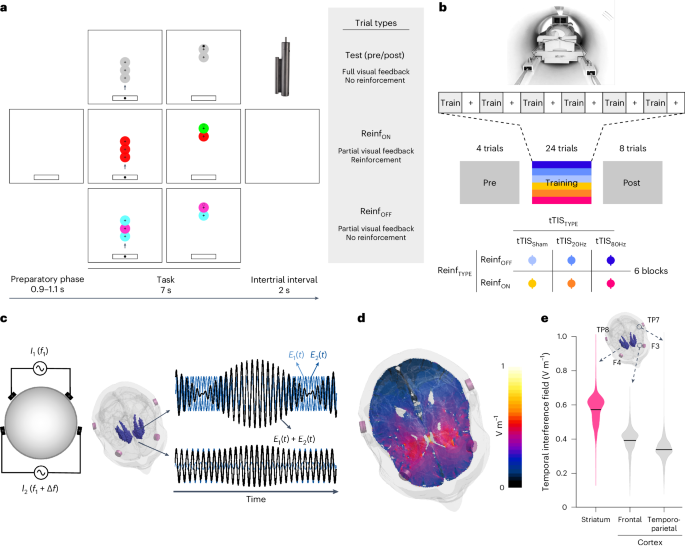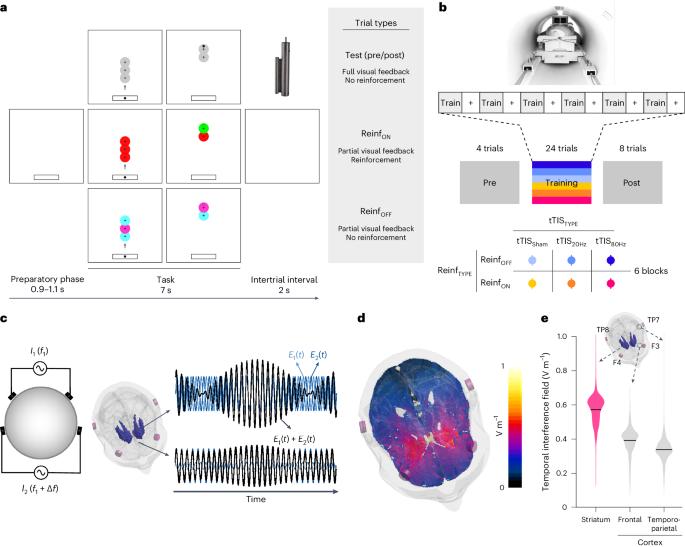对人体纹状体的非侵入性刺激会干扰运动技能的强化学习
IF 21.4
1区 心理学
Q1 MULTIDISCIPLINARY SCIENCES
引用次数: 0
摘要
强化反馈可以改善运动学习,但其潜在的大脑机制仍未得到充分探索。尤其是人类纹状体内特定振荡活动模式的因果关系尚不清楚。为了解决这个问题,我们在一项随机、假对照、双盲研究中利用了一种最近开发的非侵入性深部脑刺激技术--经颅颞叶干扰刺激(tTIS),在强化运动学习过程中同时进行神经影像学检查。以80赫兹(而非20赫兹)的频率进行纹状体tTIS刺激,可消除强化对运动学习的益处。这种效应与纹状体内神经活动的选择性调节有关。此外,80赫兹(而非20赫兹)的tTIS增加了纹状体对参与强化运动学习的额叶区域的神经调节影响。这些结果表明,tTIS 可以无创、选择性地调节纹状体参与强化学习的机制,从而扩展了我们研究大脑深层结构与人类行为之间因果关系的工具。本文章由计算机程序翻译,如有差异,请以英文原文为准。


Non-invasive stimulation of the human striatum disrupts reinforcement learning of motor skills
Reinforcement feedback can improve motor learning, but the underlying brain mechanisms remain underexplored. In particular, the causal contribution of specific patterns of oscillatory activity within the human striatum is unknown. To address this question, we exploited a recently developed non-invasive deep brain stimulation technique called transcranial temporal interference stimulation (tTIS) during reinforcement motor learning with concurrent neuroimaging, in a randomized, sham-controlled, double-blind study. Striatal tTIS applied at 80 Hz, but not at 20 Hz, abolished the benefits of reinforcement on motor learning. This effect was related to a selective modulation of neural activity within the striatum. Moreover, 80 Hz, but not 20 Hz, tTIS increased the neuromodulatory influence of the striatum on frontal areas involved in reinforcement motor learning. These results show that tTIS can non-invasively and selectively modulate a striatal mechanism involved in reinforcement learning, expanding our tools for the study of causal relationships between deep brain structures and human behaviour. Vassiliadis et al. use transcranial temporal interference stimulation—a non-invasive deep brain stimulation technique—to show that stimulation of the striatum applied at 80 Hz disrupts the ability to learn from reinforcement feedback.
求助全文
通过发布文献求助,成功后即可免费获取论文全文。
去求助
来源期刊

Nature Human Behaviour
Psychology-Social Psychology
CiteScore
36.80
自引率
1.00%
发文量
227
期刊介绍:
Nature Human Behaviour is a journal that focuses on publishing research of outstanding significance into any aspect of human behavior.The research can cover various areas such as psychological, biological, and social bases of human behavior.It also includes the study of origins, development, and disorders related to human behavior.The primary aim of the journal is to increase the visibility of research in the field and enhance its societal reach and impact.
 求助内容:
求助内容: 应助结果提醒方式:
应助结果提醒方式:


